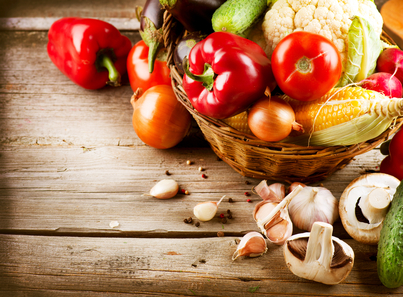by Dr. Craig A. Maxwell
Is organic produce better for your health? As more information emerges about the health risks of genetically modified food, chemicals used on plants, and processing concerns, many households are turning to organic. However, the expense of these foods has many questioning whether or not the health benefits are really worth it.
They are, and I’ll tell you why.
Two years ago, Stanford University released a study claiming organic and conventional produce both contain the same amount of nutrients, which seemed to suggest that spending more money on organic produce is unnecessary.
This is misleading. While some of the nutritional content of conventionally-grown produce has, indeed, been shown to be similar to that of organic, organic produce contains far fewer levels of pesticides and heavy metals.
This includes toxic cadmium, a heavy metal that has been associated with the development of cancer.
Higher Levels of Antioxidants Mean More Health for Your Dollar
“The amount of antioxidants we maintain in the tissues of our bodies is directly proportional to how long we will live.” – Dr. Richard Cutler, MD, former director of Anti-Aging Research at the National Institute of Health
In addition to containing far less potentially dangerous pesticides and heavy metals, organic produce contains up to 69 percent higher levels of antioxidants, which help fight free radicals that can lead to chronic disease.
Free radicals are atoms or groups of atoms with an unpaired number of electrons. They are formed when oxygen interacts with certain molecules, either as a natural byproduct of cellular function or as a result of exposure to environmental toxins such as cigarette smoke, air pollution, pesticides, and exposure to UV light or radiation.
The antioxidants in organic produce help to offset the dangerous effects of these compounds, which can help prevent premature aging, chronic disease, and early death.
According to a study published in Behavioral Ecology[1. http://beheco.oxfordjournals.org/content/18/6/1100], inadequate levels of antioxidants have been shown to have a negative effect on the mating and parenting behavior of male fish.
This suggests that lack of sufficient antioxidants may have a role in the development of mood disorders.
Another study published in Investigative Ophthamology & Visual Science[2. http://www.iovs.org/content/54/1/555.full], showed that a deficiency in the antioxidant, glutathione peroxidase-1 (GPx1), exacerbated retinopathy in laboratory mice.
A study published in the Journal of Nutrition[3. http://jn.nutrition.org/content/131/3/1010S.short], showed that aged garlic extract (AGE) protects DNA against free radical–mediated damage and mutations, while providing protection against some forms of UV-induced immunosuppression.
A diet rich in antioxidants has also been shown to reduce the risk of heart disease, stroke, and certain types of cancer.
The more organic produce you eat, the more nutrients you’re taking into your body in one serving. Furthermore, though it may cost a bit more upfront, it may save you a great deal of money in medical costs later on down the road.
You May Not Know How Good Food Should Taste
Many people claim they don’t like the taste of vegetables. They either refuse to eat them altogether or cover them up with dressing or sauce to make them more palatable.
If you’ve ever tasted the difference between a home-grown tomato and a conventionally-grown one purchased at the grocery store, you’ve gotten an inkling of what all produce used to taste like to your great-grandparents.
Vegetables weren’t always bland and they shouldn’t be. This lack of taste is a direct result of the depletion of soil nutrients caused by the introduction of mechanized farming in the mid 1920s.
The time from field-to-plate has also increased over the years. This greatly affects the taste as well.
Conventional farming techniques have reduced the nutrient content of soil by depleting its essential microorganisms. Studies have shown a significant decline in protein, calcium, phosphorus, iron, riboflavin (vitamin B2), and vitamin C in produce over the past 50 years.
This is why taking dietary supplements has practically become a necessity!
Even Insects Know Enough to Stay Away from Genetically Modified Foods
A couple of years ago, portrait photographer, David Liittschwager, traveled the world photographing the life that wandered into one-cubic-foot metal frames he placed in nature. He did this to spread awareness of the human effect on our delicate ecosystem.
NPR commentator and science writer, Craig Childs, decided to duplicate this project by setting up his own frame and camera among the genetically engineered corn stalks on a 600-acre farm in Iowa.
He found virtually NO signs of life save a single spider, an ant, one red mite, a mushroom, and some grasshoppers.
It would seem purchasing organic produce not only offers an improvement in your health but that of the planet as well.
How to Save Money on Organic Fruits and Vegetables
One of the best ways to save money on organic produce is to shop local farms. Oftentimes, the farmer may not use pesticides (or will use a very limited amount) but cannot afford to pay for the USDA organic label. These foods are often far less expensive than what you can find in your grocery store.
To find a farm in your area, visit: http://www.localharvest.org/
Buying items in bulk, either at discount stores or online, is another good way to save on the cost of organic produce. Frozen organic produce is often less expensive than fresh and just as healthy. Buying organic produce by the bag instead of loose can save you a few dollars as well.
Another way is to have your own garden. Here is a unique way to grow lots of organic vegetables in a small space:
The expense of switching to a primarily organic diet may seem daunting at first but the benefits are well worth it. I suggest spending more of your disposable income on organic food and cutting corners elsewhere.
It’s one of the best things you can do for your health.
Where You Purchase Your Seeds Is Important
Read Next:










